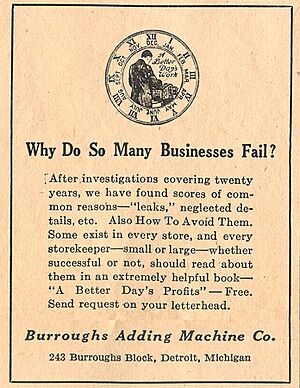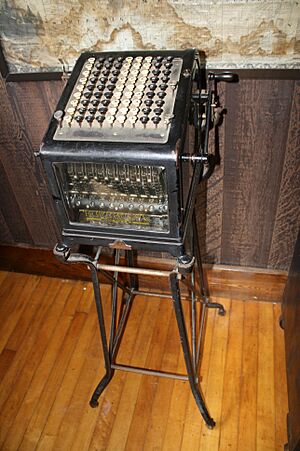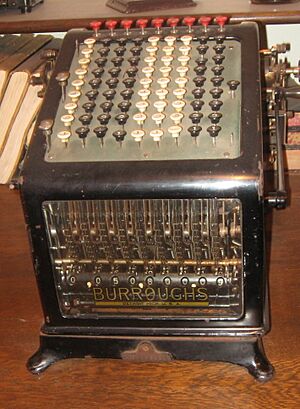Burroughs Corporation facts for kids
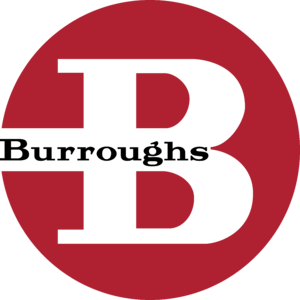 |
|
|
Formerly
|
|
|---|---|
| Industry |
|
| Fate | Merged with the Sperry Corporation |
| Successor | Unisys |
| Founded | 1886 |
| Founder | William Seward Burroughs I |
| Defunct | 1986 |
| Headquarters | St. Louis, Missouri, U.S. |
The Burroughs Corporation was a big American company that made business machines. It started in 1886 as the American Arithmometer Company. The founder was William Seward Burroughs I. In 1986, Burroughs joined with Sperry UNIVAC to create a new company called Unisys.
Burroughs' story shows how computers grew over time. First, they made mechanical adding machines. Later, they moved into machines that could keep track of finances. Eventually, they became one of the largest makers of big, powerful mainframe computers. They also made other equipment like typewriters and printers.
Contents
How Burroughs Started and Grew
In 1886, the American Arithmometer Company began in St. Louis, Missouri. Its goal was to make and sell an adding machine invented by William Seward Burroughs I. He was the grandfather of a famous writer named William S. Burroughs.
Six years after William Burroughs passed away, in 1904, the company moved to Detroit. It also changed its name to the Burroughs Adding Machine Company. Soon, it became the biggest adding machine company in America.
Cool Inventions: Evolving Machines
Burroughs started with simple adding machines. The first one, called the Class 1, could only add numbers. It used a hand crank. A special part called a "dashpot" made sure the machine worked smoothly.
This machine also had a keyboard where you pressed keys for numbers. You could check your numbers before the machine added them. It printed the numbers and the total on a paper roll. This meant you had a copy of your work.
More Advanced Adding Machines
The Class 2 machine, also called the "duplex," could keep two separate totals. The Class 6 machine was made for bookkeeping. It could even subtract numbers directly.
Around 1910, Burroughs bought the Pike Adding Machine Company. After this, they released the Class 3 and Class 4 adding machines. These were much better because operators could see what was being printed on the paper tape. People called these machines "the visible" because of this improvement.
In 1925, Burroughs made a smaller machine called "the portable." The Class 8 could add, and the Class 9 could add and subtract. Later models, like the P600 and P612, could even be programmed a little.
Beyond Basic Adding
Burroughs also made "ten-key" machines for faster calculations. They even made key-driven calculators, similar to a comptometer. These came in both manual and electric versions.
In the late 1960s, Burroughs helped create electronic display calculators. These used "nixi-tubes" to show numbers.
One very important machine was the Sensimatic. It could do many business tasks almost automatically. It had a moving part that could keep track of financial records. It could store many balances during these operations.
The Sensimatic then became the Sensitronic. This machine could store balances on a magnetic stripe on the ledger card itself. When you put the card in, the machine would read the balance. Later, Burroughs made computer systems like the E1000 to E8000. These could use card readers and printers.
Eventually, Burroughs sold more than just adding machines. They also sold typewriters.
Moving into the Computer World
The biggest change for the company happened in 1953. The Burroughs Adding Machine Company changed its name to the Burroughs Corporation. It started making digital computers, especially for banks.
This big step began in 1956 when Burroughs bought the ElectroData Corporation. ElectroData had already built a computer called the Datatron 205. The first major computer from Burroughs after this was the B205.
In 1968, Burroughs made the L and TC series, like the TC500. These had a special printer and a small amount of memory. They were popular in banks as terminals connected to bigger computers.
Burroughs also worked with the Federal Reserve Bank in the 1950s. They helped develop magnetic ink character recognition (MICR). This technology is used to process bank checks. Burroughs made special machines to sort and read checks. This helped them become a key player in the banking computer industry.
A Big Player in Computers
In the 1960s, Burroughs was one of the nine main computer companies in the United States. IBM was the largest. The others included Honeywell, NCR Corporation, Control Data Corporation (CDC), General Electric (GE), Digital Equipment Corporation (DEC), RCA, and Sperry Rand (UNIVAC line).
IBM was much bigger than all the others. So, this group was often called "IBM and the Seven Dwarves." By 1972, GE and RCA left the mainframe business. The remaining five companies behind IBM became known as the BUNCH. This name came from their first letters: Burroughs, UNIVAC, NCR, CDC, and Honeywell.
Burroughs was a strong competitor. Like IBM, it tried to offer everything its customers needed. This included printers, disk drives, tape drives, and even computer paper and typewriter ribbons.
Cool Computer Designs and Ideas
Burroughs created three very new computer designs. These designs were made to work well with specific high level programming languages like ALGOL or COBOL. All three were powerful mainframe computers:
- Burroughs Large Systems: These started with the B5000 in 1961. They used the world's first operating system that could run many programs at once using "virtual memory." Their operating systems were programmed in special versions of ALGOL. Many computer experts think these computers were very advanced for their time. They were built in a way that made them very secure and reliable. Burroughs Large Systems were used in almost every big bank, including the Federal Reserve Bank. Burroughs also built the main systems for SWIFT, which sends messages between banks worldwide. Unisys still provides services to SWIFT today.
- Burroughs Medium Systems: These were computers like the B2500. They were mainly for businesses. They were designed to run COBOL programs very well.
- Burroughs Small Systems: These were computers like the B1700. They were designed to be very flexible. Each program could have its own special "virtual machine" that was perfect for the programming language it used.
Burroughs also made very small general-purpose computers called B700 "microprocessors." These were used alone or to control other parts of bigger systems.
Other Products and Projects
Burroughs made many accounting machines. These included stand-alone systems like the Sensimatic and special terminals like the TC500. They also made equipment for processing checks.
In 1982, Burroughs started making personal computers. These were the B20 and B25 lines. They used Intel chips and a special operating system. These computers could connect to each other in a local area network to share a hard disk. Some of these microcomputers were even made in Kunming, China.
Burroughs also worked with the University of Illinois on a powerful computer called the ILLIAC IV. This computer had many processors working at the same time.
They also made computers for the military, like the D825. This was one of the first true "multiprocessor" computers, meaning it had many brains working together.
Joining Forces with Sperry
In September 1986, the Burroughs Corporation joined with the Sperry Corporation. Together, they formed a new company called Unisys. For a while, Unisys kept making the Burroughs computers.
Over time, the computer market changed. Unisys eventually stopped making some of the older Burroughs computer lines. However, Unisys still develops and sells the A-Series, which is now called ClearPath.
Burroughs Name Returns for Payment Systems
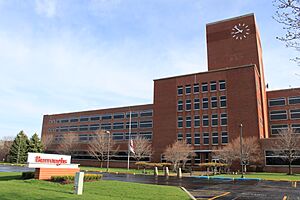
Burroughs (Payment Systems), Inc., in Plymouth, Michigan, 2011
|
|
|
Formerly
|
Burroughs Payment Systems, Inc. (2010–2012) |
|---|---|
| Founded | 2010 |
| Headquarters | Plymouth, Michigan, United States |
| Products | Payment processors |
| Parent | Marlin Equity Partners |
In 2010, Unisys sold its Payment Systems Division. This part of the company became a new company called Burroughs Payment Systems, Inc. Later, it was just called Burroughs, Inc.. This company is based in Plymouth, Michigan.
 | Lonnie Johnson |
 | Granville Woods |
 | Lewis Howard Latimer |
 | James West |


